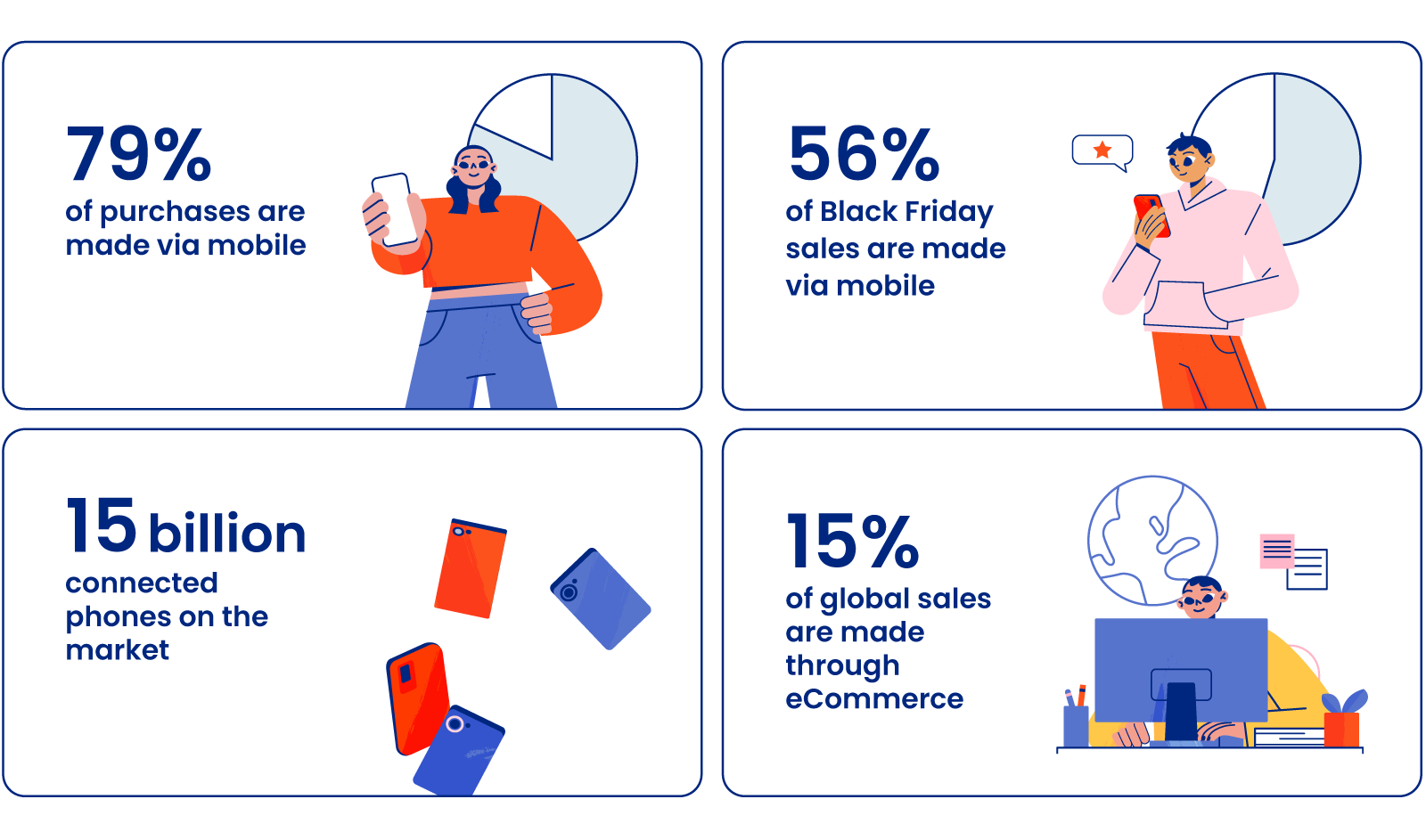You’re probably wondering what exactly mobile commerce refers to. But before we talk about that, let’s start at the beginning.
If you have an eCommerce website, it’s more important than ever to provide an easy shopping experience for the user. The well-designed interface, intuitive navigation and fast loading speed are aspects that build this experience and, most of the time, they determine whether the user will return to you or not.
What’s changing in eCommerce?
Most likely, eCommerce consumers will interact most with a website and shop on their mobile phone or tablet, rather than on a desktop.
Moreover, statistics show that in recent years the trend in eCommerce is upward, with an increasing number of consumers preferring to buy quickly and securely from a mobile device that they can take anywhere with them and access at any time.
With this information in mind, you can already think about your options to create a context that meets all your customers’ expectations for the shopping experience.

What is a mobile application
A mobile app is a software application developed to run on a mobile device, such as a phone, tablet, or smartwatch. These applications can run on operating systems such as iOS or Android and can range from simple games to complex solutions, depending on customer needs.
Through a mobile application, information that consumer needs is always accessible, which makes the application much more convenient for them.

What is mobile commerce
In the digital age, mobile apps are part of people’s daily lives. Whether we are talking about social media, entertainment or business, applications are vital in how we interact with technology.
Thanks to improved branding and personalization for pleasant user interaction, mobile apps have become market leaders. Over half of internet traffic comes from mobile apps.
What does mobile commerce mean
Mobile Commerce refers to the process of buying online through a mobile device, during which all transactions are carried out in the mobile application.
This category of mobile apps improves a user’s shopping experience, which will generate a higher conversion rate and revenue for the app owner, in addition to many other benefits that we will present to you later in this article.
According to the latest statistics, 79% of those who own a mobile have shopped online through this device, and their number is constantly growing.
Mobile Commerce in 2023

In 2023, mobile commerce is expected to continue to grow and become an increasingly important sales channel for businesses. That’s why, below we let you discover the types of mobile apps we can build for you, along with many of the advantages it can offer.

Categories of mobile commerce applications

Mobile Shopping
All users want to be able to have the freedom to choose how to make a purchase. The omnichannel presence of a brand is the solution to give this freedom to consumers. The mobile device plays a key role in the success of mobile commerce shopping, and the mobile app is an important step in this direction.

Mobile Banking
Apps through which Financial Institutions, especially banks, use both SMS, Apps and chatbots to send alerts and account activities.

Mobile Payments
Mobile payment is an alternative to traditional payment channels such as cash, check, credit cards and others. Mobile payments facilitate these payments and in-app purchases.
In eCommerce, the buying experience depends on the computer and the website you are browsing from, but M-Commerce attracts a much more personal buying experience.
If you happen to be one of the 6.4 million mobile users (80% of the global population), you understand that our daily routines depend on this technology. The mobile phone is always present next to each of us: we check email, scroll through the daily news, make video calls with colleagues during work hours and spend time on social media before bed. All of this has become our new habits, and much of these take place in mobile apps.
Many people use their mobile phone to save time – paying for food orders at home and shopping online have become common practices. And that’s where mobile commerce comes in, helping users make these online transactions much easier.

The benefits of mobile commerce

Improved customer experience
The user can log into the application, save the desired products and customize other functions of the application according to preferences.

Access to user data
Mobile commerce gives you access to your users’ data. Information about a user it starts being stored as soon as they log into the mobile app. The app owner has access to this information when there is a campaign, or they want to send certain personalized messages to users.

Marketing opportunities
By creating a better customer experience, it builds another marketing channel where the use of mobile apps can be done to the fullest!

Profit
Profit is always a key factor in making decisions related to business development. In the case of mobile shopping applications, the profit is guaranteed.
Benefits for your business


What the ecommerce statistics say
With year-on-year growth of 12.4%, eCommerce is expected to continue in the same trend until 2024. This is driven by a combination of technological advances, changing consumer behavior and the ongoing impact of the COVID-19 pandemic.
Source: https://litslink.com/blog/m-commerce-stats-and-trends

How do we help you at isidors?
1. We plan together:
We set the objectives of the application, identify the target audience, and analyze the existing market. We decide together the platform on which the application will run iOS, Android or both.
2. We conceive the design:
We create the design of the application: user interface and user experience, assess the variants and decide together the final version.
3. We develop the application
At this stage we develop the application code, functionalities, databases and evaluate the usefulness of the application.
4. We test the application
We make sure that the application is functional and there are no errors.
5. We launch the application
After the testing stage, the application can be launched in the App Store or Google Play. The customer can choose to promote the application in the online environment.

